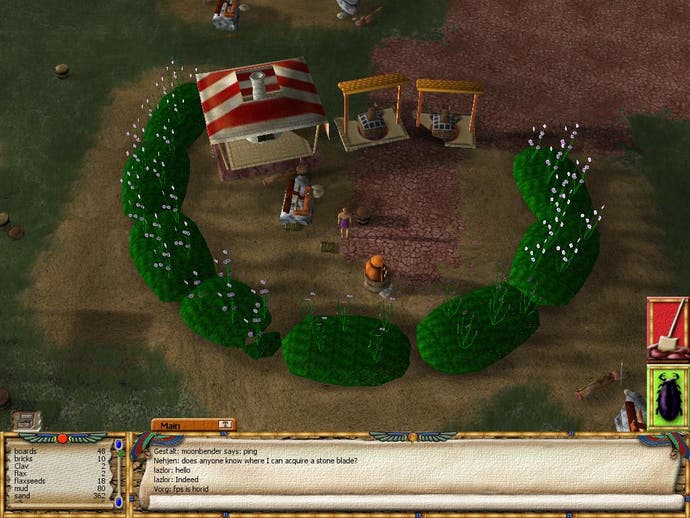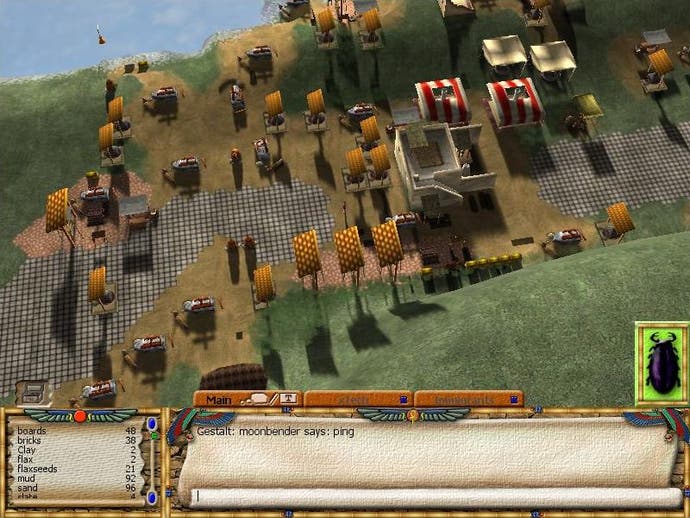A Tale In The Desert
Preview - a massively multiplayer game without fighting, monsters or experience points - whatever next?
While most massively multiplayer games are firmly focused on killing and looting, a small American company called eGenesis is working on a radically different approach to online gaming. There are no monsters to battle, no dungeons to explore, no experience points or levels. Instead the emphasis is on construction and cooperation. Which turned out to be a refreshing change when we took a beta version of the game for a spin recently.

The Team Works
Set in ancient Egypt, A Tale In The Desert is such a departure from the conventions of the genre that it's hard to say whether or not it's really massively multiplayer. For starters the game has a definite beginning and end, with players working together or competing against each other to complete tasks, uncover new technologies and pass tests in a variety of disciplines. All of which has an impact on the world in which you live, which is a far cry from the static settings of most massively multiplayer games. From the moment you enter the game you'll be gathering resources and constructing buildings. As you learn new skills you can start to build up your own little settlement, starting out with some flax gardens and a couple of brick moulds and working your way up from there to larger projects such as pottery kilns, charcoal furnaces and mines. These can be either restricted to your own use, opened up to other members of your guild or even donated to the public, something which was surprisingly common during the last beta test. Partly this is thanks to the abundance of resources. Obviously sand and mud are in plentiful supply, and you can grab as much as you want with a couple of mouse clicks. Grass is also surprisingly common for a game with the word "desert" in the title, and leaving it to dry in the sun for a few minutes after picking it will turn the grass into more useful straw. Wood can be pulled from trees, although these are few and far between in most areas and take a few seconds to replenish after they have been harvested. Again, you can use the wood directly as fuel for your kilns and furnaces or cut it up into boards for construction. Some of this can be a little time consuming, but usually there's plenty to keep you busy while you wait for your bricks to dry off, and thankfully anything in a building belonging to you is your personal property and can't be picked up by other players while you're off searching for silt along the river bank or taming camels in the distant desert.

Industrial Wasteland
This might all seem a little overwhelming when you first start playing, and indeed there's precious little in the way of in-game help. Instead players must rely on each other, and thanks to the mentor system more experienced players are actively encouraged to help out newcomers to Egypt. One of the tasks on the path of leadership requires you to show people how to gather resources and construct some basic buildings, at which point they can build a shrine in your honour. Get enough shrines and you complete the test. Not to mention the fact that having little brick shrines scattered all over the game world praising your name is something of an ego boost. Leadership isn't just about passing tests though. You can also set up your own guild so that players can share tools and buildings and construct a big guild house to act as their base. Politics plays its part as well, and Tale In The Desert is one of the few online games that allows players to have a say in how their world is run. New laws can be written by gathering enough signatures on a petition to trigger a vote which every player can take part in. During the last beta, for example, one enterprising player tried to pass a law to stop people creating buildings right next to existing camps. Indeed, this was one of the few major problems to emerge during the beta. By the end of the three days some parts of the game world had turned into a vast industrial sprawl of wall-to-wall mines, fields, carpenter's shops, kilns, furnaces and houses, and there was nothing you could do to stop a neighbour from covering your back yard with his own buildings and fields. There was also a total lack of sound effects and music in the beta, which kept the download size to a minimum but did sap the game of atmosphere. Our only other concern at this point was that the hardcore players were putting in several hours a day and rapidly working their way through the tech tree, which meant that while some people were still banging bits of stone together and trying to work out how to build their first kiln, others were already building vast monuments and complex machines by the third day. Unless there is far more to the tech tree than we have seen so far, the rate of advancement will need to be greatly slowed down to avoid games ending within a week or two of them starting. Judging from the beta though A Tale In The Desert is shaping up to be a novel and surprisingly entertaining new take on the massively multiplayer genre, with a much greater emphasis on community and co-operation between players as they work together to turn Egypt into a thriving civilization.
-
A Tale In The Desert screenshots

